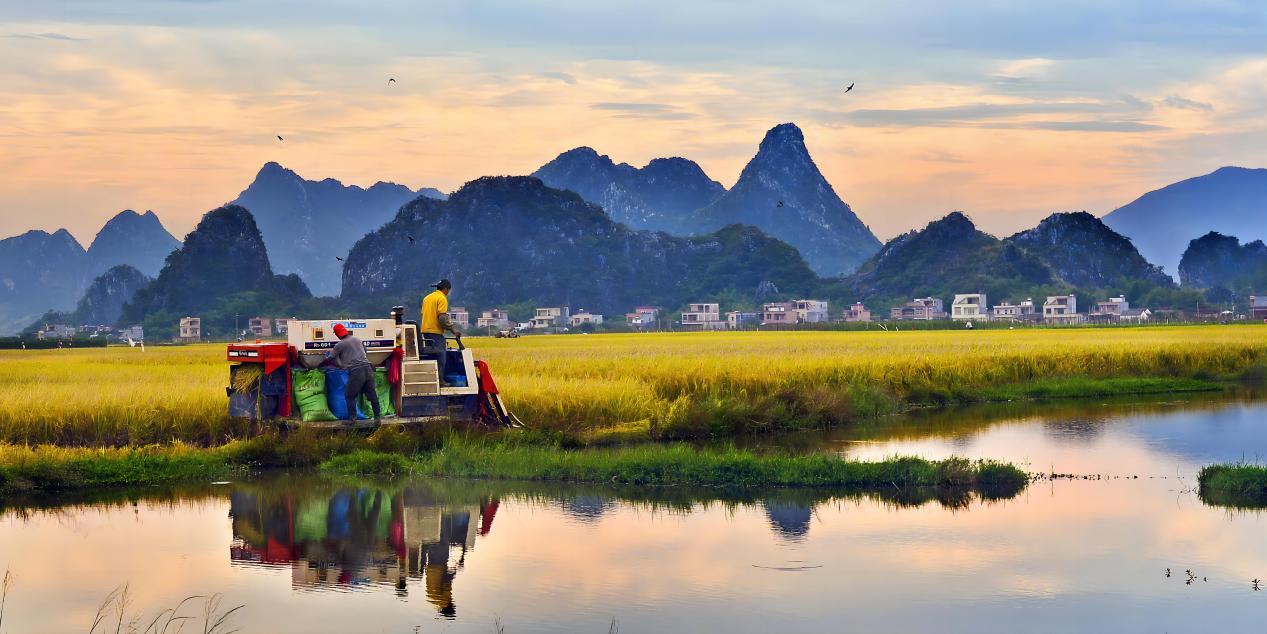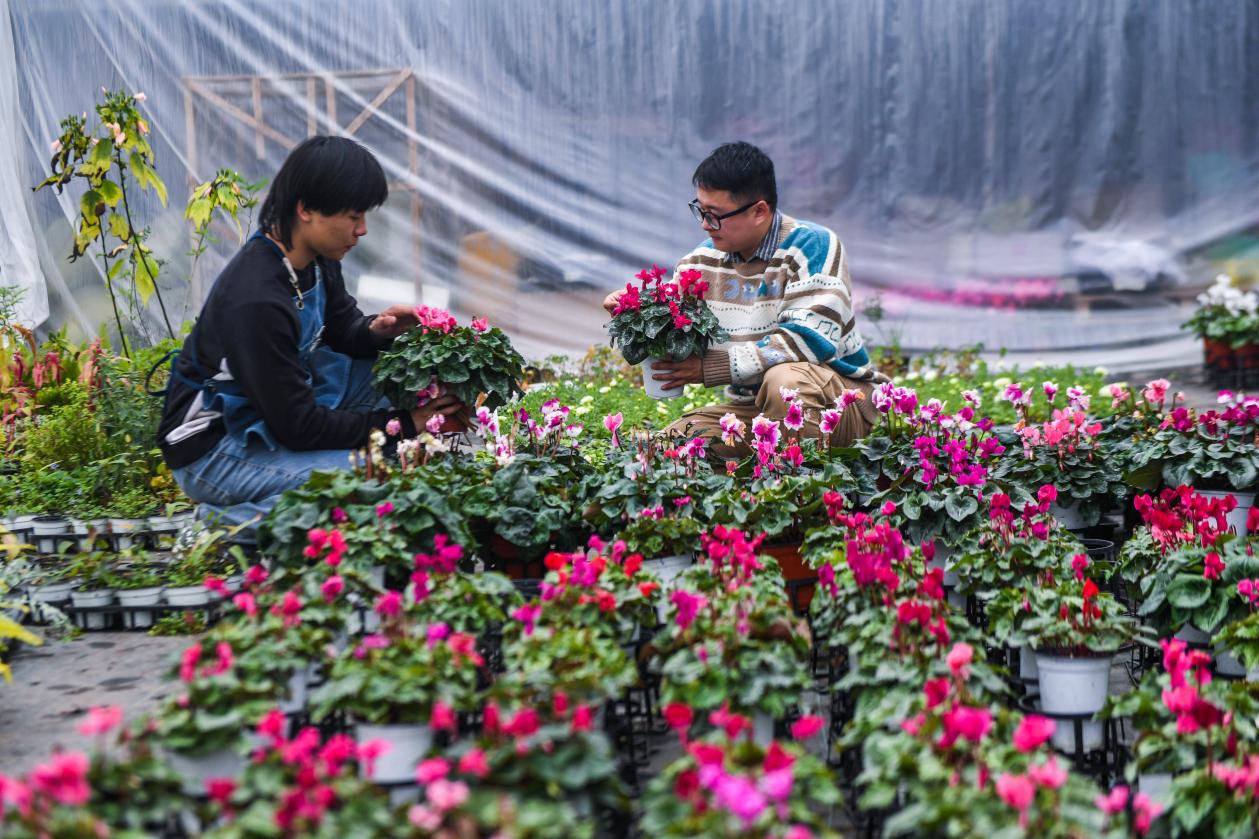

Written by Li Min / Translated by Chen Zhiying
Issues relating to agriculture, rural areas, and rural people are fundamental to China, as they directly concern our country’s stability and our people’s well-being. Addressing these issues, China should prioritize rural revitalization. In Southeast
Asia where agricultural resources are abundant, rural revitalization and agriculture improvement are also in the central place of ASEAN’s work agenda to reduce poverty and promote economic development, therefore, “poverty reduction and rural revitalization” is one of the key cooperation areas between China and ASEAN in 2023 as this year marks the “ASEAN-China Year of Agricultural Development and Food Security Cooperation”.
Talents are the key of reducing poverty and revitalizing rural areas. In regions of China where agricultural technologies are more advanced, agricultural entrepreneurs are using their intelligence and expertise to develop agriculture, contributing their efforts to China’s poverty reduction and rural revitalization.
What are agricultural entrepreneurs? What experience can ASEAN countries draw from them?

Agricultural entrepreneurs who work miracles
Fishermen install sensors on the fish pond and place them on its edge control boxes. The boxes, which are connected to the monitoring center in the town, send information such as water temperature and oxygen content to the fishermen’s mobile phones... Since using efficient and convenient IoT technology, many people have benefited from fish farming.
In Linghu Town in Zhangjiang Province’s Huzhou City, one of the four major freshwater fish breeding bases, fishermen used Qingyutang Smart Fishing Service Platform and embarked on the path of scientific fish farming and income increase. The platform now has more than 40,000 registered households, provides services to nearly 600,000 farmers and about 100,000-mu fish ponds, helps to build nearly 1,000-mu ecological fish ponds, and increases farmers’ income by more than 10%.
The developer of Qingyutang is Shen Jie, a post- 80s entrepreneur who returned home in 2016. He is also a PhD who graduated from the Chinese Academy of Sciences, an adjunct professor of Fudan University, and an agricultural entrepreneur. The concept of “agricultural entrepreneurs” was first put forward by Zhejiang Province in China. According to relevant documents, the term refers to those who are under 45 years old, have college degree or above, start businesses and innovate in the agricultural field, and serve as the head of agricultural production and operation entities such as farmers’ professional cooperatives, agricultural enterprises, and family farms, or have equity in those agricultural institutions.
The 44-year-old Zhang Xiangjun is the general manager of Jinzifeng Grain and Oil Development Co., Ltd. in Yanling County, Zhuzhou City, Hunan Province. His company covers businesses like oil tea bases, hotels, and restaurants, which can make an annual revenue of more than 20 million yuan. Twenty years ago, he was a farmer who went South to work in Guangdong Province. Clever enough, he acquired experience in production and management and capital. To echo China’s battle against poverty, he returned home and rented more than 2,000-mu barren mountains to set up Yanling Dongfeng Oil Tea Planting Professional Cooperative, developed oil tea bases, and established Jinzifeng Camellia Oil Factory. Adopting the mode of “company+ cooperatives+bases+impoverished households”, he created jobs at home for 220 households and lifted them out of poverty.
Besides creating jobs and promoting common prosperity, agricultural entrepreneurs brought pastoral life to city residents. In 2017, Zhou Gongbin and like-minded friends built a team called “Ant Pioneer” in the mountainous area of Suichang County, Lishui City. Combining city dwellers’ hobbies with rural areas’ abundant natural resources, they designed seven self-driving off-road routes, attracting tourists and investment capital to the local area and driving the sales of local agritainment, hotels, restaurants, and agricultural specialties, with an income increase of over 57.4 million yuan. With more and more agricultural entrepreneurs, technology experts, and online hosts showing up in rural areas, facilities like book bars, coffee shops, and gyms have been improved, the same as those in cities. The boundary between cities and rural areas is increasingly blurring.

These are stories of agricultural entrepreneurs promoting agricultural transformation, poverty alleviation, and job creation, as well as driving urban and rural integration. They show the significance of cultivating such talents.
How do agricultural entrepreneurs bring agriculture to life?
With the improving living standards in the China-ASEAN region, paying brand premiums for agricultural products has become a trend. What measures can be taken to invigorate agriculture in the face of increasingly fierce competition? In China, agricultural entrepreneurs mostly innovate agricultural management methods with new ideas, new technologies, and new models to bring new vitality to traditional agriculture.
According to Zhang Meixiang, Director of Humanistic Quality Teaching and Researching Office of Zhejiang Institute of Economics and Trade, agricultural entrepreneurs center on brand building and adopt the measures of enriching brand connotation, digging brand culture, and promoting brand images to expand sales, which helps to meet the demands of the market, improve the values of the brand, accumulate intangible assets for agricultural enterprises’ development. Brand cultivation also promotes agricultural supply-side reform such as the technology development and standardization in planting, processing and other links, which facilitates agricultural highquality development.
Agricultural entrepreneurs who master new technologies are able to fully play the role of “agriculture+technology”. By integrating new technologies into agricultural industrial chains, they optimize product structures and promote the transformation and upgrading of production methods in variety selection and cultivation, planting, and breeding; Technological innovation in agricultural product harvesting, storage, and transportation improves the added value of agricultural products; Integrating modern information technologies such as big data, cloud computing, the Internet of Things, and the mobile Internet into agricultural value chains helps agriculture to usher in a smart era.
Different from farmers who went to cities to work in the 1980s and government staff who started businesses in rural areas in the the 1990s, agricultural entrepreneurs cover a wider range of people and are at a higher level. They not only include returned migrant workers, college and secondary specialized school graduates, retired military personnel but also have scientific and technological personnel, returnees from abroad, and business owners in them. Most of them are skilled talents, with both business acumen and entrepreneurial enthusiasm, some capital and some market knowledge.

These agricultural entrepreneurs who handle agriculture and market at the same time not only produce competitive agricultural products but also fully dig the potential values of rural areas, rural land, and rural flavors to develop leisure tourism and sightseeing tourism. They also integrate agriculture with the secondary and tertiary industries and launch new services like customized planting and research study tourism, which contribute to fostering new agricultural forms.
In the ASEAN-China Year of Agricultural Development and Food Security Cooperation, we are looking forward to seeing more measures in innovating agriculture and promoting agricultural entrepreneur exchanges taken by China and ASEAN countries, so that to inject great impetus into poverty reduction and rural revitalization.
Chinese mode in cultivating agricultural entrepreneurs
To cultivate agricultural entrepreneurs is to cultivate new entrepreneurial talents for agricultural development. However, whether in rural or urban areas, starting businesses is not easy. It needs support in resources, funds, talents, and policies, therefore, the government must first identify who may become agricultural entrepreneurs and then provide targeted guidance, support, and training.
Jiande City of Zhejiang Province adopts “local recommendation”, “one-to-one assistance”, and “talent introduction” to identify and cultivate agricultural entrepreneurs, aiming to attract young people to return home to get jobs and start businesses.
Cheng Jiahang, a post-95 youth who achieved an average monthly sales of more than 500,000 yuan before the 2023 Spring Festival, went back hometown to start businesses through the Jiande Student Information Base. He used Internet knowledge to help rural native eggs become the best seller in a short time and created a brand called “Chan Ka”. In a year, he sold more than 100,000 boxes of native eggs from his own breeding bases and surrounding farmers, with a turnover of more than 4 million yuan.
“One-to-one assistance” means tutors and technical experts will provide assistance during entrepreneurship, while “talent introduction” means the government provides agricultural projects to attract talents.
Regardless of the cultivation method, as the new force of agricultural development, they need government’s all-round support and financing guidance. In fact, attracting talents to return to the countryside to help poverty reduction and develop agriculture is also an important task of many ASEAN countries.
For example, in Thailand, which faces rural hollowing, most of the farmers who work in or return to the countryside increase their income by expanding the planting area rather than developing agricultural technology. This led to the fluctuation of agricultural product prices and thus seriously affected their income, even made them return to poverty. Such areas are the priorities of the Thai government in alleviating poverty.
In fact, rural areas in Thailand are rich in agricultural resources that are worth developing. For example, rural specialties emerging from the “one village, one product” project and rural tourism resources are helpful to realize “agriculture+”. By learning from Chinese modes, Thailand and other ASEAN while making broader their own agricultural development space.
桂ICP备14000177号 Copyright@2006-2013 Guangxi China-ASEAN Panorama Magazine Agency Co., Ltd. All Rights Reserved